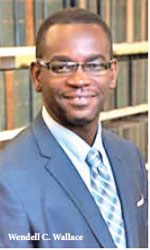

 It has been argued that crime and crimerelated issues are major concerns for Caribbean peoples and governments. With old crime threats continuing unabated and newer threats eme rging on the Caribbean landscape, it appears that Caribbean law enforcement agencies are unable to deal with the incidence of criminality in the region. It has been argued that crime and crimerelated issues are major concerns for Caribbean peoples and governments. With old crime threats continuing unabated and newer threats eme rging on the Caribbean landscape, it appears that Caribbean law enforcement agencies are unable to deal with the incidence of criminality in the region.
Mindful of this, a team including students from The UWI St. Augustine Campus took up the challenge to tackle crime from an academic standpoint. The conference hosts were the Policy Studies Organisation, the International Journal on Criminology, and the American Public University, all based in Washington DC, USA.
The UWI team was the largest contingent of presenters from any one university and comprised five postgraduate students and one undergraduate student. This presence gave rise to eight Caribbean-themed papers at the 1st International Criminology Conference on Crime, Criminals, Criminality, and Criminology at Historic Whittemore House, in Washington, DC.
The UWI contingent comprised of PhD candidates in Criminology and Criminal Justice facilitated five panels on crime in the school context; policing and the criminal justice system. Stephen Williams, presented a paper on Using GPS Tracking to Reduce Homicides and Shootings in Trinidad and Tobago: A Randomised Trial. He submitted that the Trinidad and Tobago Police Service (TTPS) was able to utilise a Global Positioning System (GPS) tracking system which assisted in the reduction of homicides and shootings in Trinidad and Tobago. Williams, however, lamented the lack of updated equipment to further enhance the capacity of the TTPS in reducing homicides and shootings using GPS tracking. Another police-related presentation came from Zola Phillips on the nature of witness care in the criminal justice system in Trinidad and Tobago. She highlighted several deficiencies within the system and cogent suggestions to remedy them.
Ayinka Nurse-Carrington, presented on The ability of mothers to parent while imprisoned in Trinidad and Tobago. Still doing her research, she lamented some practices at the Women’s Prison in the island, but noted that several reforms are taking place at a ‘frustratingly stultifying pace.’ Karen Lancaster-Ellis presented data on criminally-minded individuals in Trinidad and Tobago, where perceived pleasure outweighed the perceived pain, leading to the commission of criminal offences.
The final two presentations addressed Teacher Perceptions of the impact of School Violence on Caribbean Societies and An Exploratory Study on the Impact of Organized Crime on Societies in Small Island Developing States with Evidence from Five Caribbean Countries respectively. The first study used the ‘Circle of School Violence’ model to situate teachers’ perceptions of the impact of school violence on Caribbean societies. The other presentation argued that organised crime proliferates in the Caribbean due to our porous borders, weak law enforcement and relatively small budgets (when compared to financialresources of some international crime groups). Further, in combatting organised crime; national sovereignty, political will and differing priorities sometimes hinder a cross-Caribbean approach.
The opportunity to share academic research with the rest of the world augured well for a deeper understanding of crime and social issues facing the region as well as possible academic solutions to the present crime situation in the region. The experience was particularly rewarding for the PhD candidates who were given advice on measures to improve their dissertations.
This review was written by Dr Wendell C. Wallace, a Criminologist at The UWI, St Augustine Campus |





